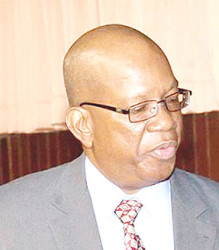Local farmers and manufacturers may soon get concessionary loans if the Caribbean Development Bank (CDB) finds it feasible for Guyana to resuscitate an agricultural development bank here.
“To further enable the environment, government has been discussing the idea of a development bank to ensure our manufacturers, agro processors and service providers have access to capital to gain a competitive edge in the areas of our greatest comparative advantage, food security,” Finance Minister Winston Jordan said on Wednesday at a Guyana Manufacturing and Services Association (GMSA) dinner.
“In this context, we have just requested CDB to commission a study to examine the demand for and the feasibility of establishing such a financial institution,” he added.
Guyana once had such a bank–GAIBANK.
Chief Executive Officer (CEO) of the Guyana Bank for Trade and Industry John Tracey, at a Rice Industry Development Conference in July, had recommended that rice stakeholders introduce a financial instrument for the payment by millers to farmers that would alleviate the frustrations in dealing with the delays that continue to hinder the sector.

He said that an agricultural development bank posed a great risk but would not deter commercial banks from offering such services if they were prepared to deal with the risk factors.
Jordan on Wednesday pointed out that another part of his government’s economic plan for development is recognising that micro-enterprises can be promoted as a means of establishing economic independence for youth and not only create employment for them but encourage entrepreneurship among young persons, with specific emphasis in areas of agriculture. “We have to be the initiators of policies, projects and programmes that aim to harness the creative potential of our private sector into the reality of sustainable development of our country. We must release the productive force and entrepreneurial spirit of individuals, companies and groups,” he said.
Results of a CDB study released this year states that youth unemployment in Guyana is hovering around 40%.
CDB President Dr William Warren Smith has said that the bank views agriculture as vital to the prosperity of the region and countries like Guyana, with large rural populations, can develop a modern agriculture sector, creating jobs and reducing their food import bill.
Jordan said that while the aim is to get Guyana in a food production mode that sees manufacturing merged with technology, the two areas are subjects which the private sector must continually analyse and formulate solutions.
He lamented that while the country produces many food products, its manufacturing and export of them are illustrative of critical areas that need improvement. “No product of Guyanese origin is a household name in Caricom, save and except El Dorado rum. If Barbados can sell us sugar cake, Trinidad can sell us fried channa in plastic bottles, assorted tamarind balls and fudge in boxes, if we can import matches from as far away as Czech Republic and Poland or plantain and cassava chips from Central America, why can’t we manufacture these basic products, where we have all the ingredients grown locally, and sell to our neighbours?” he questioned.
“Isn’t it a crying shame that Caribbean Airlines serves plantain chips made in Central America or serves coffee or tea, sweetened by sugar that doesn’t carry the sweet Demerara gold label? The private sector is technologically unsophisticated, having never gone through an industrial revolution. Our infrastructure, technology, marketing sophistication, global competitiveness and industrialisation stage confirm this,” he also said.
As a solution, Jordan challenged the private sector to take the leadership role in nurturing and promoting more broad-based and inclusive growth.
“This existing private sector, with its access to capital and its many domestic and international networks, must include the “historically excluded” in its business planning. Contract farming is a model of inclusiveness. Sub-contracting is another successful global model. We are one economic family. We share the same patrimony. Guyana cannot develop with one eye, one leg and one arm,” he said.
Meanwhile, Jordan also noted that the Guyana Office for Investment (Go-Invest) is being streamlined and strengthened so as to accelerate investment. He said that a new board of directors has been constituted, a new head of the agency is being recruited and international funding was being sought for a private sector development project that would include components dealing with the Single Window Automated Processing System and a ‘one-click” button linking GRA, the Deeds Registry and the Lands and Surveys Commission, all with the aim of cutting red tape and freeing a system that is stifling private sector growth.









